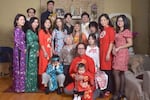Reporter’s notebook: I grew up celebrating Tết with my family. The start of the Lunar New Year is one of the most important holidays in Vietnamese communities. I reached out to other Vietnamese Americans to reflect on what the holiday means to them.
The Lunar New Year is one of the two biggest holidays in East and Southeast Asian communities.
Around the world, the multi-day festival brings families and friends together to celebrate the new year based on the Chinese lunar calendar, which tracks the year based on the different cycles of the moon.
Most countries in the world today use the common January-through-December Gregorian calendar, which follows the rotation of the earth around the sun. However, most East and Southeast Asian communities also base important cultural holidays like Lunar New Year and the Mid-Autumn Moon Festival around moon cycles tracked on the annual lunar calendar.
This is why holiday dates can change from year to year.
Over the weekend, Vietnamese families like mine came together to celebrate Tết, short for Tết Nguyên Đán. The literal translation is “Festival of the First Day” which means the festival of the first day of the new year, and is the Vietnamese name for the Lunar New Year.
In my family, we celebrate by eating a savory Vietnamese rice cake called bánh tét, passing out lucky red envelopes filled with money called li xi, and wearing fancy Vietnamese outfits called áo dài.
The tradition of Tết dates back centuries and, like the Chinese equivalent, honors ancestors and ushers in the new animal in the Vietnamese zodiac calendar.
2023 is the Year of the Cat, which symbolizes longevity, positivity and cleverness.
I spoke with a few Vietnamese American Portlanders about why Tết matters to them and to their families.
Lisa Nguyen
Lisa Nguyen runs the Portland donut company Heyday Donuts. She grew up in California and loved spending time with family during Tết and going to huge festivals.
“They used to have those huge festivals, and you’ll see all the performances and the singing and the dancing and the áo dài and all that stuff,” she says.
But when she came to Oregon, she noticed that there weren’t as many festivals celebrating Tết.

Lisa Nguyen, owner of Heyday Donuts, wants to educate her children on the importance of Tết.
Courtesy Michelle Pearl
“Here, there are not that many options for us. And so we have to really look for ways and activities to expose our kids to,” Nguyen says.
Still, that hasn’t stopped her and her family from finding communities to celebrate the Lunar New Year. Now that she has children of her own, she’s taking steps to ensure that they learn about their own culture.
“My kids will only remember as much as they can. As time and years go on and as they get older, if I skip a step, that step’s gonna be forgotten,” she says.
She makes it a point to take her children to as many events as she can, such as the Lunar New Year festivals at Lan Su Chinese Garden or the Portland Convention Center. She also works with their schools to teach all children about the Lunar New Year.
“If I can teach my kids to be proud of that and to be able to do that without hesitancy, it’s really important for them to be able to pass it down again and be excited to pass it down again.
Vyvyan Doan
Just like Lisa, Vyvyan Doan grew up celebrating Tết with her family. She grew up in Oregon and currently runs the online marketplace Ooh What’s This?, which offers a space for small business owners to sell Asian-inspired goods like soaps and candles.
Doan loves Tết because she gets to see her family grow in size.
“There’s a new grandchild, there’s a new niece or nephew, and it’s really fun, and you see my aunts and uncles going through their milestones, and it’s a fun time to reflect and to just be with one another,” Doan says.

Vyvyan Doan, far right, celebrates Tết, the Vietnamese Lunar New Year, with her family.
Courtesy Thai Tan Nguyen
This year is especially important because Doan is celebrating with a new member of her immediate family.
“My son was born last year in October and so this is going to be his first Lunar New Year,” she says. “And I want to be able to really give him that experience as he gets older throughout the years.”
Doan says she’s come to have a different appreciation for the holiday the older she gets, and is happy to share that appreciation with her friends.
“They’re really excited to celebrate Tết. They ask a lot of questions, and that’s what makes me excited to be able to continue the celebration and try to put it together in the way I remember it and the best that I can.”
She’s also noticed that there is more attention from the wider community celebrating Lunar New Year.
“Especially with the younger generation, they’re putting a lot of effort into keeping some of that culture alive. And so more and more people are coming out regardless of what their cultural background is. You don’t have to be Asian to celebrate Tết.”
She wants to instill the same values in her son.
“It takes away a huge part of where we came from if we don’t celebrate the culture. It’s not just celebrating us and the upcoming generation, it’s about celebrating our ancestors,” she says.
She hopes to take her son to Vietnam so that they may truly experience Tết in the way it was culturally meant to be celebrated.
Nhan Danh
There’s also a spiritual side of Tết that many Vietnamese people celebrate.
Nhan Danh is the founder and coach at White Lotus Dragon and Lion Dance, a nonprofit lion dance team that performs at special events.
Every Tết, he and his team perform a special ceremony to essentially bring new life to the new lion costumes they receive.
“We order custom-made handmade lions from Malaysia and get them imported here to Portland,” he says. “And then once they come in, we’ll brush the fur, we’ll get it all ready, and then we’ll take it to a Buddhist temple to do the eye dotting ceremony, which is basically waking up the lions and bringing the spirits into the lion.”

White Lotus Dragon and Lion Dance founder Nhan Danh, center, poses in front of lions during a celebration of Tết , the Vietnamese Lunar New Year.
Courtesy Elvis Nguyen
Tết is an important time because Danh gets to teach his younger students about what the holiday means to the Vietnamese diaspora.
“They’re getting to that age where they can formulate their own opinions and thoughts behind the celebration,” he says. “And if we can somehow keep these traditions and add a little modern twist to it then the future generation will be motivated to continue on with the celebration.”
Danh wants his students to learn more than just the physical aspects of lion dancing. There’s also a spiritual reason behind what they do.
“There is a reason why when a lion goes into a business they scratch the door. Or you come into your home and you greet your elders and make your offerings, lighting incense and putting it on the altar,” he says.
Tết is a time for people like Nhan Danh, Vyvyan Doan, and Lisa Nguyen, to reflect on the past year, and be hopeful for the new year.
And whether it’s with family, or with friends, they all agree it’s important to celebrate the past, so that they can teach it to the future.
“There’s not a right or wrong way to celebrate Tết, but you do wanna celebrate it in a way where it’s impactful and it’s fun and it’s meaningful to future generations,” Danh says.
